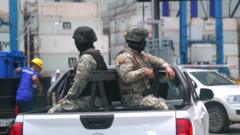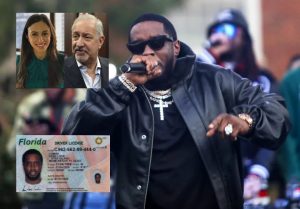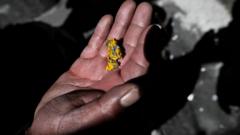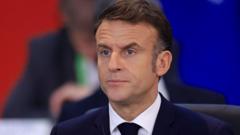The increase in cocaine exports is straining Ecuador’s social fabric, as criminal networks leverage legal trade routes to facilitate illicit drug smuggling, creating alarming levels of violence and economic distress in the nation.
**Ecuador's Cocaine Crisis: The Dark Path to Europe's Drug Market**

**Ecuador's Cocaine Crisis: The Dark Path to Europe's Drug Market**
Ecuador is becoming the central hub for cocaine trafficking to Europe, driven by rising consumption rates and violent gang wars.
The Albanian mafia has significantly expanded its operations in Ecuador, capitalizing on lucrative drug trafficking routes despite the country lacking local production. César, a member of the Latin Kings, exemplifies the situation; pressured by threats from gang leaders, he aids the Albanian networks by corrupting port officials to facilitate cocaine smuggling from neighboring Colombia and Peru. Ecuadorian President Daniel Noboa noted that a staggering 70% of the world’s cocaine flows through its ports, underscoring the country's growing role in global drug trafficking.
Trapped between their economic struggles and gang coercion, workers like truck driver Juan unknowingly contribute to the trade, transporting illicit cargo hidden among legitimate goods. The banana export industry, which constitutes a majority of Ecuador's shipping containers, provides an efficient cover for drug traffickers, allowing them to blend contraband into seemingly innocent shipments.
The violence associated with this trade reached alarming levels in January 2025, when Ecuador recorded 781 murders, many linked to drug-related conflicts. The police have made record drug seizures, indicating a concerning rise in trafficking operations. Major Christian Cozar Cueva of the National Police confirms that cocaine shipments to Europe have increased by approximately 30% in recent years, further endangering those involved in the supply chain.
Ecuador's vulnerability to foreign criminal organizations has been exacerbated by post-pandemic economic fallout, which has made individuals more susceptible to gang recruitment. Prosecutors and law enforcement officials agree that the high demand for cocaine in consumer countries, especially in Europe, drives this ongoing crisis. The United Kingdom, with a market worth around £11 billion and a noticeable rise in cocaine consumption, stands out as a significant contributor to the drug trade's growth.
Experts warn that addressing supply-side issues in Ecuador alone will not suffice; the demand in consumer countries must also be curtailed. President Noboa has echoed this sentiment, underscoring the need for global cooperation in the fight against drug trafficking and its devastating implications for Ecuadorian society.
The message is clear: Europe's appetite for cocaine not only perpetuates violence and loss in Ecuador but also raises serious moral questions surrounding substance consumption and its broader societal impacts.



















